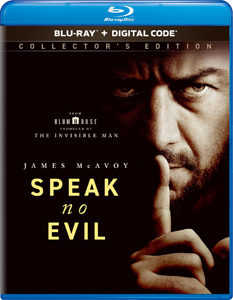“Speak No Evil” will be scary to many viewers, but especially those who worry over social interactions. Director/co-writer James Watkins (“Eden Lake”) remakes the 2022 Danish-Dutch film “The Guests” by the Tafdrup brothers, who get co-writing credit on this Blumhouse version.
Nothing more horrific than awkwardness
Landing on the awkwardness meter somewhere between “Midsommar” and “Who Invited Them,” “Speak No Evil” chronicles an American family that has recently moved to London. Watkins masters the slow but steady buildup as the Daltons meet a west country family while on vacation in Italy.
Paddy (James McAvoy) and Ciara (Aisling Franciosi) are Type A’s living life to its fullest, a contrast with the straight-laced and timid Daltons – husband Ben (Scoot McNairy) and wife Louise (always reliable Mackenzie Davis).
“Speak No Evil” (2024)
Director: James Watkins
Writers: James Watkins, Christian Tafdrup, Mads Tafdrup
Stars: James McAvoy, Mackenzie Davis, Scoot McNairy
While this remake is unnecessary since the original version is in English, there’s no issue of this new cast phoning it in. McAvoy gives another tour-de-force horror performance reminiscent of “Split.” And he’s so buffed-up that I had to remind myself he was Professor Xavier, not Wolverine. We can’t be sure what Paddy will do in any given scene.
Franciosi, who has become known for off-kilter horror turns herself, plays wife Ciara, and again this is great casting. Franciosi is naturally sweet-looking, but there’s something a little off about this couple. For one thing: They’ve been together 17 years, but Ciara is awfully young-looking.
Other strong performances come from the actors playing the kids – the Daltons’ Agnes (Alix West Lefler), prone to panic attacks, and the farm family’s mute Ant (Dan Hough).
Don’t be a square, man
I’m guessing most viewers relate more to the Daltons right off the bat, and “Speak No Evil” lightly mocks us for being so square as to observe all the social niceties rather than living it up. When Paddy and family invite the Daltons out to their farm, Ben and Louise fret over whether it’s appropriate to spend a week with people they’ve only met once.
Watkins and the Tafdrups gradually ratchet up the bizarreness of the vacation, like when Paddy gets a little too sexually explicit when describing his marriage at dinner. He and Ciara are those types who back out of social faux pas by suddenly announcing that they were just kidding, you should’ve seen your face, etc.
“Speak No Evil” will have some parents screaming at the screen when the kids come into the picture, though. Of course you’d say the hell with social niceties if your child is in danger. But what if your kid is merely in an awkward situation? Is that enough to destroy budding friendships? While the Daltons don’t always make the correct decision, the writing is sharp enough to not force them to be Stupid Horror Movie Characters in order to keep them at the farm so we can get to the revelation of what’s really going on here.

They’re caught in a series of unlikely but plausible social situations, and for the viewer, “Speak No Evil” functions like a multiple-question thought experiment. That, along with the earthy performances and some very human moments (like Agnes’ attachment to her stuffed bunny), keeps us glued. We subconsciously brace ourselves as matters escalate.
Because we let them
One minor quibble – one that I have with a lot of weird-horror of this type – is that after the big reveal, we aren’t hit with further revelatory shocks. It’s like the filmmakers said, “OK, that’s enough. We won’t push you any further.” But to reach that next level of “keep you up at night” greatness – something achieved by the aforementioned “Midsommar” – it should have.
The conclusion is bluntly effective, though, as it connects on beats of revenge and the question of what parents would do to protect their kids.
With the great line “Because you let us” (on par with “Because you were home” from “The Strangers”), “Speak No Evil” presents its thesis statement. We have two contrasting families, two contrasting lifestyles, and two contrasting views on the very nature of how to behave in a society. Which one (if either of them) is right?
But Watkins doesn’t drill down into the theme, and in this specific case we simply have good and evil. This might be a flaw or it might be the right call, as some horror movies are ruined by slathering on too much social commentary. I think I would’ve liked a bit more, but the director is content to make a slick, well-acted chiller-thriller.
Why do they keep remaking perfectly fine horror movies? Because we let them. In the case of “Speak No Evil,” though, I don’t mind.

